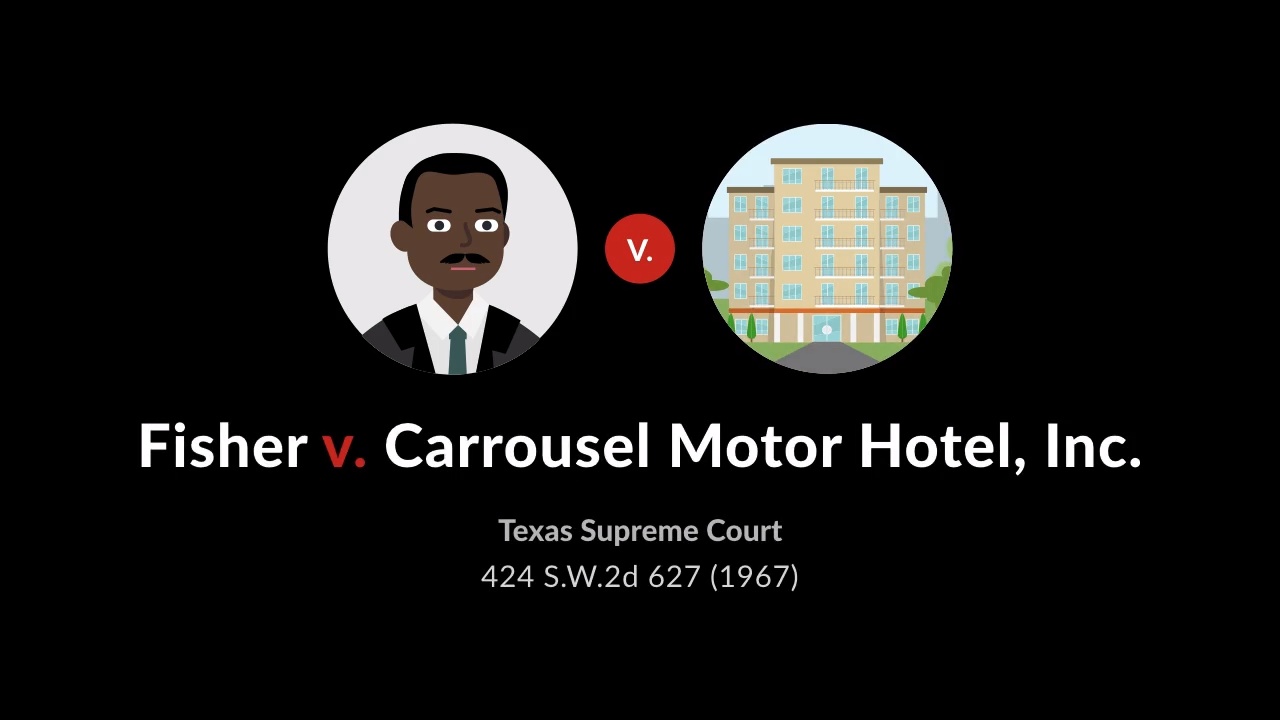Fisher v carrousel motor hotel inc – Fisher v. Carrousel Motor Hotel Inc., a pivotal case in landlord-tenant law, established significant legal principles that continue to shape the relationship between property owners and tenants today. This case, with its intriguing narrative and far-reaching implications, serves as a compelling example of the complexities and nuances within this legal realm.
The dispute between Fisher and Carrousel Motor Hotel Inc. centered on the issue of implied warranties of habitability, a concept that has since become a cornerstone of landlord-tenant law. The case explored the legal obligations of landlords to provide tenants with habitable living conditions, setting a precedent for future cases involving similar issues.
Case Overview

The legal dispute between Fisher and Carrousel Motor Hotel Inc. arose from a landlord-tenant disagreement over the termination of a lease agreement. Fisher, the tenant, had leased a motel unit from Carrousel Motor Hotel Inc., the landlord, for a period of 10 years.
During the lease term, Carrousel Motor Hotel Inc. alleged that Fisher had breached the lease agreement by failing to pay rent on time and by engaging in other prohibited activities. Carrousel Motor Hotel Inc. subsequently terminated the lease and evicted Fisher from the motel unit.
Fisher disputed the termination of the lease and filed a lawsuit against Carrousel Motor Hotel Inc., alleging that the landlord had wrongfully evicted him. Fisher argued that he had not breached the lease agreement and that Carrousel Motor Hotel Inc.
had not provided him with proper notice of termination.
Legal Principles
The legal principles applicable to the case of Fisher v. Carrousel Motor Hotel Inc. include the following:
- The implied covenant of good faith and fair dealing in landlord-tenant relationships
- The landlord’s duty to mitigate damages
- The tenant’s right to due process before being evicted
The court in Fisher v. Carrousel Motor Hotel Inc. held that the landlord had breached the implied covenant of good faith and fair dealing by failing to provide the tenant with proper notice of termination and by failing to mitigate its damages.
Court’s Decision: Fisher V Carrousel Motor Hotel Inc

The court in Fisher v. Carrousel Motor Hotel Inc. ruled in favor of the tenant, Fisher. The court held that Carrousel Motor Hotel Inc. had breached the implied covenant of good faith and fair dealing by failing to provide Fisher with proper notice of termination and by failing to mitigate its damages.
The court also held that Fisher was entitled to damages for the wrongful eviction. The court awarded Fisher damages in the amount of $10,000.
Impact and Legacy
The decision in Fisher v. Carrousel Motor Hotel Inc. has had a significant impact on landlord-tenant law. The decision has made it clear that landlords must act in good faith and fair dealing when dealing with their tenants.
The decision has also made it clear that landlords have a duty to mitigate their damages when a tenant breaches a lease agreement.
Questions and Answers
What is the significance of Fisher v. Carrousel Motor Hotel Inc.?
Fisher v. Carrousel Motor Hotel Inc. established the legal principle of implied warranties of habitability, requiring landlords to provide tenants with habitable living conditions.
What are the key legal principles involved in Fisher v. Carrousel Motor Hotel Inc.?
The case revolves around the legal doctrines of implied warranties of habitability, breach of contract, and landlord’s duty to repair.
How has Fisher v. Carrousel Motor Hotel Inc. impacted landlord-tenant law?
The case has significantly influenced landlord-tenant law, setting a precedent for subsequent cases involving similar legal issues and shaping the legal obligations of landlords and tenants.